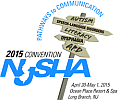Is There a Cognate Advantage for Typically Developing Pre-School-Aged Spanish Speaking English-Language Learners?
Thursday, 11:00am to 1:00pm
Seabright
Poster 1
Cognates are words, which are phonologically similar in two languages. These words are defined as translation pairs with greater than 70% overlap on a phonologically based scale, developed by Kohnert (2004). For example, "radio" and "radio" are cognates, which have 100% phonologically similar in both languages, where "dog" an"perro" are non-cognates, which have 0% phonological overlap in both languages. This study aimed to examine whether there is an advantage to using cognates when teaching typically developing Spanish-speaking pre-school aged English-language learners (ELLs) vocabulary in English. Five Spanish-speaking preschoolers were recruited from a childcare center in New Jersey. The Expressive One Word Picture Vocabulary Test, third edition (EOWPVT-3), was administered to test the participants' expressive vocabularies in English and the Peabody Picture Vocabulary Test, third edition (PPVT-3), was used to test their receptive vocabularies in English. A Spanish-English bilingual graduate student in Speech-Language Pathology administered both tests. Final analysis is expected to show that the use of cognates will help bilingual children with language development in both languages. In addition, it might prove helpful for monolingual speech-language pathologists to use cognates to assess children in a language that the SLPs do not know.
Track:
Pediatric
